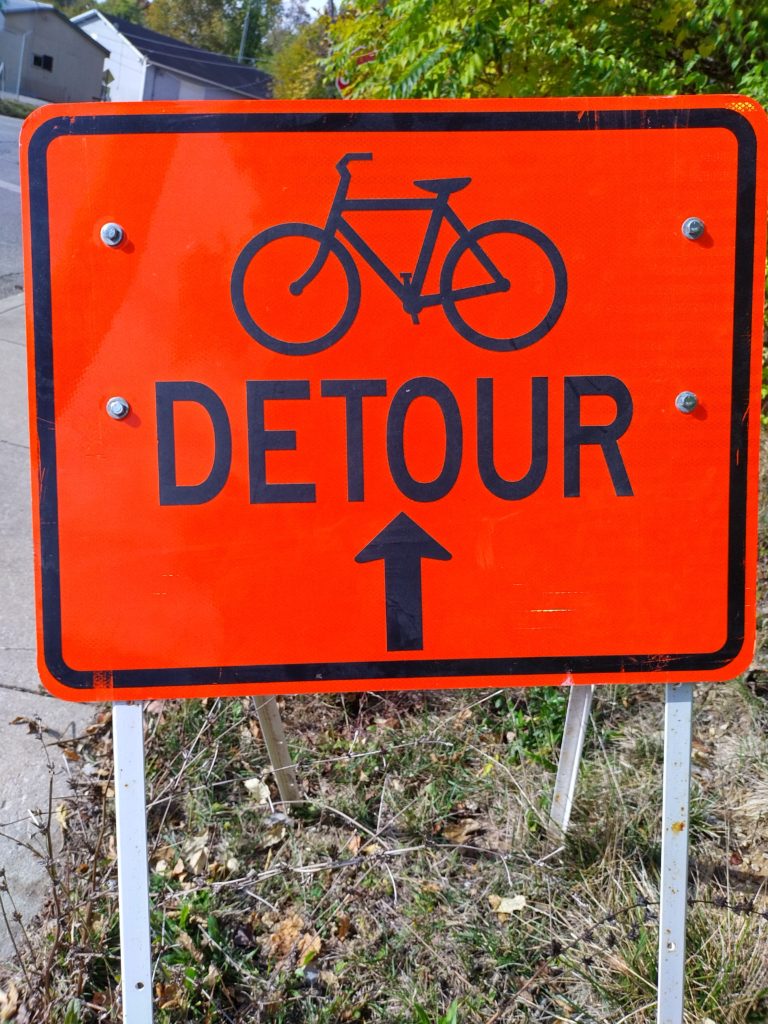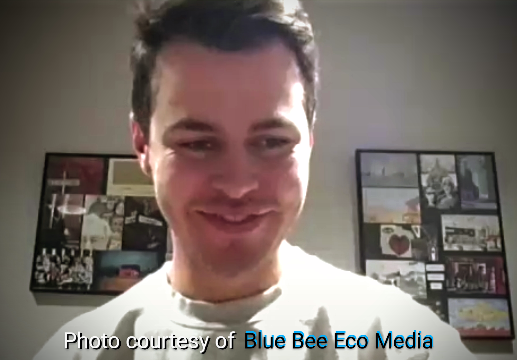Podcast: Play in new window | Download (Duration: 30:44 — 42.3MB)
Subscribe: RSS
| Hello and welcome to Eco Report. For WFHB, I’m Cynthia Roberts. And I’m Robert Shull. Coming up later in the program, Environmental Correspondent Zyro Roze speaks with Hank Duncan of the City’s Bicycle and Pedestrian Safety Commission about potential changes to bike infrastructure on the south edge of the University and to find out which organizations were awarded this year’s BPSC Local-Motion grant. |
|
And now for your environmental reports: The Fifth National Climate Assessment indicates, that despite a decrease in U.S. CO2 emissions and reduced costs for renewable energy, the nation remains susceptible to the impacts of climate change. The report foresees a doubling of heatwaves, a 50% increase in droughts, and heightened cyclone and wildfire activity across the country, even with ongoing efforts to limit global warming. Highlighting the significance of preparedness for these impacts, the assessment examines adaptation and mitigation activities across the United States. Data reveals coastal states in the West and Northeast lead in such efforts due to heightened risks. However, the report underscores the nationwide impact of climate change, with Southern states facing elevated risks despite varying preparedness levels. For instance, Mississippi, South Carolina, Georgia, and Alabama show lower preparedness, while Florida stands out as an exception alongside well-prepared states like California, Massachusetts, Washington, New York, and Maryland. Indiana is among the least prepared in the Mid-West. —Norm Holy |
| Despite the clear human and environmental toll of global warming, countries are taking only “baby steps” to rein in greenhouse gas emissions, a senior U.N. official said, summarizing a new U.N. report card on the promises made by governments so far. Restoring global forests where they occur naturally could potentially capture about a third of the amount that humans have released since the beginning of the Industrial Era, according to a new study published in the journal Nature. The research, with input from more than 200 authors, leveraged vast troves of data collected by satellites and on the ground and was partly an effort to address the controversy surrounding an earlier paper.
That study, in 2019, helped to spur the Trillion Trees movement but also caused a scientific uproar. The new conclusions were similar to those in a separate study published last year. Mainly, the extra storage capacity would come from allowing existing forests to recover to maturity. But major caveats remain: If we protect all current forests, where will people get timber, rubber and palm oil? Would forests be able to store carbon quickly enough? And how much forest carbon would be lost to fire, drought and pests as climate change intensifies? The level of carbon storage cannot be achieved without cutting greenhouse gas emissions, said Thomas Crowther, the study’s senior author and a professor of ecology at ETH Zurich, a university in Switzerland. “If we continue emitting carbon, as we’ve done to date, then droughts and fires and other extreme events will continue to threaten the scale of the global forest system, further limiting its potential to contribute.” Forests are essential to tackling both the climate and biodiversity crises. They offer food, shelter and shade to humans and countless other species. They clean our air and water. And they pull climate-warming carbon out of the atmosphere. As the climate crisis intensifies, that ability has made them controversial: How much can we rely on trees to get us out of this mess? There is one thing they all agreed upon: To tackle both climate change and biodiversity loss, the world must do far more to cut fossil fuels and end deforestation of old-growth forests. For Indiana the path forward is clear: we must cease burning coal, build much more capacity in wind/solar, and transition as rapidly as possible to electric vehicles. In managing our state forests, we should reduce the current level of cutting of 14 million board feet. To have any 60 year-old trees, we should return to the time before Republican Governors required the Forestry Department to generate roughly half of its budget from logging. Until Daniels, the state allowed about 2 million board feet. To date the state has not shown the political will to work toward meeting a zero carbon future. —Norm Holy |
| New Scientist reports that yet another unwanted temperature record may have been set in 2023. According to a preliminary estimate, the global average surface temperature on the 17th of November, was more than 2° Centigrade above pre-industrial levels for the first time. “Our best estimate is that this was the first day when global temperature was more than 2°C above 1850 to 1900 (or pre-industrial) levels, at 2.06°C,” tweeted Sam Burgess at the Copernicus Climate Change Service.”
While exceeding this milestone on one day shows how rapidly the planet is warming as a result of rising greenhouse gas levels, it doesn’t mean that the 2°C warming limit has been breached. That breach will occur when the daily average temperature over a whole year reaches 2 degrees C or above. As it is expected that the El Nino event will continue into the 2024 summer, so we may have several days breaking 2 degrees C in the near future. The 2 degrees C number has been seen as a goal to stay under for at least 30 years. The nations have been remarkable in largely doing nothing to prevent this warming. —Norm Holy |
| Optimists about the shift to clean transportation often talk about a double benefit: Electric vehicles have almost zero emissions and soon they also will be less expensive than their gasoline counterparts. But the idea of the inevitability of cheaper EVs took some hits last year as the average price of lithium-ion batteries increased. Analysts reassured us that the price surge was due to short-term factors, and that the long-term trend of price decreases would likely resume in 2023.
They were right. Bloomberg NEW Economy Forum /NEF/ issued its annual battery price report this week, showing a global average price of $139 per kilowatt-hour for a lithium-ion battery pack, which is down from $161 in 2022 and lower than any year on record. The report predicts prices will continue to decline, reaching an average of $113 in 2025 and $80 in 2030. —Norm Holy |
| This is a story about a citizen having an impact on corporate decisions. A volunteer at WFHB saw a tv ad and decided to act. The Toyota commercial showed a young lad carrying an aquarium, climbing into the family vehicle and heading for the mountains. Upon arriving at a lake, the boy empties his aquarium into the lake.
The WFHB volunteer wrote a note to the corporate headquarters in the USA. The note said that introducing foreign species into our waters is always a bad idea. The note illustrated what can happen by giving an example. Lake trout were introduced into Yellowstone Lake in the 1980s, and they have taken over and eaten the native cutthroat trout. Bears coming out of hibernation historically would catch cutthroats before the grasses and berries were available. The lake trout is a deep-water fish that bears cannot catch. The bears turned to elk calves. The elk population has dropped from 16,000 to 4,000. Impacts are seen throughout the food chain. It is not known whether the letter stopped the ad. What can be said is the ad has not been seen after the company received the letter. —Norm Holy |
| Vast stretches of the US are dominated by corn, nearly 100 million acres of it, stretching from Ohio to the Dakotas. What once was forest or open prairie today produces the corn that feeds people, cattle and, when made into ethanol, cars.
Now, the nation’s airlines want to power their planes with corn, too. Their ambitious goals would likely require nearly doubling ethanol production, which airlines say would slash their greenhouse gas emissions. If they succeed it could transform America’s Corn Belt yet again, boosting farmers and ethanol producers alike, but also potentially further damaging one of the nation’s most important resources: groundwater. Several issues need resolution: ethanol provides less energy than hydrocarbons, and ethanol eats away at many plastics and rubbers. —Norm Holy |

Up next, some local organizations were awarded the Local-Motion grant earlier this week from the Bicycle and Pedestrian Safety Commission and bicyclists that use 3rd Street by I.U. may soon see new measures to keep drivers from obstructing or entering the bike lane. We now turn to Zyro Roze and Hank Duncan for more on these developments.
|
| For Eco Report, I am Cynthia Roberts. And I am Robert Shull. Are you looking for a way to make a difference on environmental issues? Here at Eco Report we are currently looking for reporters, engineers, and segment producers. Our goal is to report facts on how we’re all affected by global climate disruption and the ongoing assaults on our air, land and water.
We also celebrate ecologists, tree huggers, soil builders and an assortment of champions who actively protect and restore our natural world, particularly those who are active in south central Indiana. All levels of experience and all ages are welcome, and we provide the training you’ll need. W-F-H-B also offers internships. To volunteer for Eco Report, give us a call at (812) 323-1200, or e-mail us at: [email protected]. |
|
And now for some upcoming events: Do you know what a Smammal is? Plan to come to McCormick’s Creek State Park on Saturday, December 16th, at 10:30 am to learn about Smammals. You will explore the life of some of the tiniest critters that call the park home as you learn about the small mammals at McCormick’s Creek. |
| Join Anthony at Spring Mill State Park on Saturday, December 16th from 1 to 3 pm for a Cave River Valley Hike. This is a 2-hour rugged hike into a very beautiful and primitive natural area. Meet at the Donaldson parking lot and you will carpool 15 miles to the off-site property. There are no restrooms on the site. Please wear water proof hiking boots. |
| There will be a Lake Strahl Wildlife Hike at Brown County State Park on Sunday, December 17th, from 9 to 9:45 am. You will hike Trail 6 around Lake Strahl while learning about the wildlife in the park and around the lake. |
| The Whooper Wednesdays will continue at Goose Pond Fish and Wildlife Area until February 21st. Come to the Visitors Center on Wednesday, December 20th, at 8 am to walk the property and see if you can spot some of the resident birds, including the endangered Whooping Crane. Make sure to dress for the weather. |
| Enjoy the Full Cold Moon Hike at Spring Mill State Park on Saturday, December 23rd, from 7 to 7:45 pm. Join Anthony on Trail 6 for the last Full Moon of 2023 and hear stories of why it is called the Full Cold Moon. Meet at the Grissom Memorial parking lot. |
| And that wraps up our show for this week. Eco Report is brought to you in part by M-P-I Solar, a Bloomington business specializing in solar hot water, solar electricity and solar hot air systems. M-P-I Solar designs and installs solar power generation systems that encourage independence and individual responsibility. Found locally at 812-334-4003 and on the Web at mpisolarenergy.com. |
| This week’s headlines were written by Norm Holy. Today’s news feature was produced by Zyro Roze and edited by Noelle Herhusky-Schneider. Julianna Dailey assembled the script which was edited by Zyro Roze. Julianna Dailey compiled our events calendar. Kade Young and Noelle Herhusky-Schneider produced today’s show. Branden Blewett is our engineer. For WFHB, I’m Cynthia Roberts. And I am Robert Shull. And this is Eco Report. |
 WFHB Bloomington Community Radio
WFHB Bloomington Community Radio



